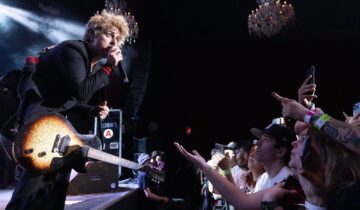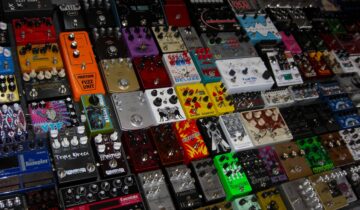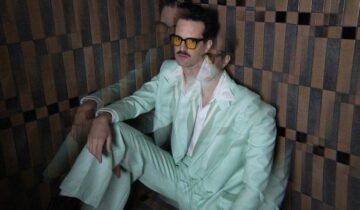 For SF Weekly: The Pixies are having a moment. Again. Their first moment happened from 1986 to 1993, when the alternative rock band from Boston played a distinct mix of strange lyrics and loud-quiet-loud-quiet song structure that was comparable to other indie music of the era but arguably became its own niche: Pixies music.
For SF Weekly: The Pixies are having a moment. Again. Their first moment happened from 1986 to 1993, when the alternative rock band from Boston played a distinct mix of strange lyrics and loud-quiet-loud-quiet song structure that was comparable to other indie music of the era but arguably became its own niche: Pixies music.
They won no Grammys or other formal accolades but were named by artists like Nirvana, Radiohead, and the Strokes as being hugely influential. The Pixies reunited in 2004 and toured worldwide (their second moment), including a 20th anniversary tour dedicated to their Doolittle album, until bassist and backing vocalist Kim Deal left in 2013. Fast forward to moment No. 3: The band is touring again to support its first new full-length album in more than 20 years, Indy Cindy, released this spring. Critics have argued it’s not the Pixies without Kim Deal, and that the band has lost its ability to terrify, yet other reports claim fans packing in to see live shows and affirming that they “still got it.”
SF Weekly spoke with Pixies drummer David Lovering about the new album, the band’s trajectory, the ’90s, and what it’s like being a band full of introverts.
SF Weekly: What was your goal for the new album? What were you aiming for?
David Lovering: We tossed this idea around for years, and we went into the studio in 2012. But to get to that point was a long, long process. There was a lot of trepidation, like, “What are we gonna do?” This is a big thing, getting everyone on board. We had been touring for 10 years, doing Doolittle shows, and the last thing you want to do after touring is go right into the studio. We said, man, we need to actually like these songs. We wanted to do something we were happy with, to show that we still have something to prove.
What is it that you wanted to prove, exactly?
That we are still a band. That we can write songs, and we can tour. That’s what we love doing. Like in 2004 when we got back, it was like riding a bike, like nothing had chanced since ’93. When we went back into the studio, it was no different. It was all comfortable. The digital electronics were different, but we can still do it.
Gil Norton, who you’ve worked with previously, produced the new album. He’s worked with Foo Fighters, Throwing Muses, Jimmy Eat World, Patti Smith. How did he help shape the sound of the record?
Gil did our last three albums. There is a comfortableness. We did think of other producers, but Gil was natural. Why not go along with what was proven already? Also, Gil knows how to handle us. I don’t know if another producer could do that.
What does it take to handle the Pixies?
You have to have the ability to work with the engineer, and get the sound. He offers lots of suggestions, we do lots of pre-production, but we bounce ideas with him. The main, main thing is tact. You gotta be an ambassador, and know how to work a situation with four dysfunctional people. Having that tact is a big part of it.
How would you describe the band’s dysfunction?
It’s hard to say. It’s just the way we operate. This time, getting a second chance, you think we’d get wiser, but not really. But it’s going fine.
When original bassist Kim Deal quit, you replaced her with Kim Shattuck of the Muffs, and then let her go. Why did both of those things happen?
Kim left on her own accord. She said I’m done, I’m going home. At that point, there’s nothing you can say. And then we went into a panic. She’s never spoken about it, and we’ve never really talked about it. I think she was just done with the Pixies. Shattuck just did not work. We never spoke about it.
Shattuck said in the press that your manager let her go after she stage-dived during a Pixies show.
Those reasons are not true. She is an extrovert, and we are introverts.
The Pixies formed in Boston in 1986. What was that very first performance like?
It was the first band for most of us. Our first show was at Jacks in Cambridge, Massachusetts, on a Wednesday night. There were maybe 10 people, mostly our friends. It was a small bar. We loved our songs, and had rehearsed for months. I was very proud to do it, but we were so nervous. Everyone was shaking like a leaf. It was very scary, especially with not many in the audience. But after that we worked, and rehearsed all the time. Tried to get from Wednesday to Friday, and play better clubs. That was our motivation, trying to get the weekend gigs at the better clubs. We did it all. The loading, the van, it was fun. I still look back at it fondly.
Back then, did you think you were starting something that would have longevity? Was that the goal?
No not at all. We were fortunate. At the time we just liked the songs. I thought they were cool. That was everything for me, to play in a band that I loved. I thought we were a great band, and we loved playing shows. We wanted to be a bigger band, but longevity, no.
Why did you disband in ’93? And what brought you back together after an 11-year hiatus?
Back then we just did albums faster and faster, and we were busy touring and being dysfunctional and not handling things well. Instead of taking a vacation, Charles [Thompson IV, aka Black Francis] just called it off. It was shocking. I loved the Pixies. It was heartbreaking. Then time went by. Around 2002, Charles was doing solo stuff, and he said as a joke we were getting back together, maybe on CNN. Interest grew, and it made everyone do a double take. Charles called Joey [Santiago], he called me, and called Kim. I am so glad we broke up in ’93, though. I don’t know if we could have made it.
In the interim you became a magician and occasionally opened for Frank Black & the Catholics. Why magic, and what does your act look like?
After we broke up, I did some other bands, did some studio work, became disenchanted, and stopped drumming. Around ’95 or ’96 I went to a magic convention in L.A. with [singer-songwriter] Grant Lee Phillips. I didn’t care about magic, and had no inkling about it, but saw a trick that blew me away, and I decided what I wanted to do. I slept with a deck of cards, and worked and worked, and bought every book I could. Then I started doing shows. It’s not a good career move to become a magician, so I developed a stage show, using my background in electronic engineering, and made a science show in a lab coat, doing physics experiments, with magic, doing things I built with props. I opened up for lots of bands. Now I have a family, a 2- and 5-year-old, so it’s fallen off a bit.
The Pixies sound has always included elements of noise and surf rock, it vacillates between loud and soft, often has vocals sung, shouted, and spoken, and lyrics not always easily understood. How much of that format was deliberate?
It just happened naturally, no plotting or formula. The musicianship, really. Kim’s bass has a lot of 8th notes. My drumming doesn’t matter, I complement what is being played. Joe’s guitar is unique, and having a female vocal next to Charles’ crazy vocals, that’s what made the Pixies sound.
Husker Du is usually listed as an influence. How so?
We did listen to them. It was in our original ad in the classifieds. We also mentioned Peter, Paul and Mary.
How much was punk part of your DNA?
For me, it was more New Wave. For Charles, it was some punk, and he writes the songs.
In the late ’80s and ’90s, “alternative” music became a thing and Pixies music thrived, in terms of critical success. How do you look back on those days?
Pop music is so widestream now. There is still alternative now, on some radio, but there was a vision then. We knew we didn’t want to be on a major label. Being younger then, we didn’t know any different. I look back fondly. It was a wonderful time.
Image: Jay Blakesberg, courtesy of The Pixies



